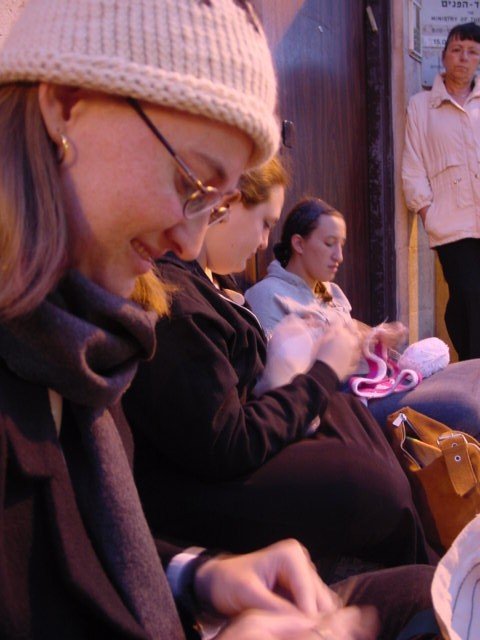November 21, 2002
Elizabeth joins the knitters waiting at the Israeli Ministry of the Interior - Jerusalem
Based on advice from the Patriarchate, we left the hotel at 5:00 a.m. for the Israeli Ministry of the Interior. There were two women already waiting there, so we joined in line. Most of those waiting were American Jewish high school and college students trying to extend their student visas. These young women took advantage of the early morning hour to call back home, chat, giggle, and to do some knitting. Elizabeth joined in with her half-finished scarf.
At 6:30, we were given numbers and told to come back at 8:00. It reminded Marthame of his high school days, camping out for concert tickets. We'd gladly pay Ticketmaster's exorbitant fees in this case, though.
At breakfast in the hotel, we heard news of a bus bombing in West Jerusalem. As we walked back to the Ministry, it was a chilling feeling, wondering where the bombing was, if the girls we'd been chatting and knitting with had been there. Was it possible that these young women, who had exuded such innocence, were among the murdered and injured? Yes, it was possible. More death, more reminders of the fragility and unpredictability of life.
A friend called from Zababdeh, concerned for our safety. We assured him that we do not, as a rule, take busses within Israel, and worried more for him as a reprisal was no doubt on the way.
We returned to the Ministry of Interior at 8:00 and the masses were hoarded into what can best be described as a Gulag - a dank, gray yard sandwiched between buildings, with distant light filtering down through the chicken wire which spanned the space from rooftop to rooftop. Numbers were called in bunches, and we headed upstairs to get a second number, relieved to see our morning's acquaintances herded up with us. When our second number appeared on a digital screen, we turned in our paperwork and passports and received a third number.
As we waited for number 746, we chatted with a British woman behind us, who told us about her organization, a strange mix of Judaism and Christianity that has found its heavenly home in modern, secular Israel. Elizabeth listened to her story, about the journey which led her to this point - mostly, it was her husband's experience, that of living under German occupation in the Channel Islands during World War II, and an affinity that developed for those who suffered at the hand of the Nazis.
It is often very frustrating to find people who have such compassion for those who suffer yet turn a blind eye to some forms of suffering because it doesn't fit a particular agenda. Particularly telling was her remark at how much had changed since her first trip to Israel in 1967, that the road from Tel Aviv to Jerusalem was so small, and the hills around Jerusalem were empty. "See the progress," she continued, "now the road is wide and modern and the hills are full of towns." Never mind that prior to 1948, the hills (there and throughout Israel) were full of Arab villages destroyed and cleansed in the War; most of their descendants are refugees living in camps or among the internally displaced living in Israel's unrecognized villages. How soon we forget our histories.
We completed our visas successfully, in no less than five hours, and danced a gleeful jig on our way out of the Ministry. We wandered around the Old City and East Jerusalem for a while, stopping to avoid a fight in East Jerusalem - some young men were getting pretty physical with each other, and a more serious consequence was avoided by the intervention of many others breaking up the fight. The presence of women and children, not to mention a vat full of boiling oil for falafel nearby, helped cool senses. Again, we note with surprise that more such incidents don't end disastrously, particularly with no Palestinian Authority (in our area - in Jerusalem, there is the Israeli police force, but notably absent most of the time in Arab neighborhoods) and rising poverty, anger, and hopelessness. The conservative nature of Palestinian society no doubt helps - communal responsibility, as well as a heightened sense of what is forbidden (both religiously and culturally) can keep things in check.
Candles on the Tomb of Christ - Jerusalem
We ended up at the Church of the Holy Sepulchre, still hauntingly absent of thronging tourists. We entered the tomb without a wait, taking a chance in the unusual quiet of the place to reflect and pray. We joined up with friends for dinner, hearing news from Bethlehem. For almost a month now, the city has enjoyed a bit of freedom (at least internally), but the suicide bomber's Bethlehem origins have everyone battening down the hatches, gathering for the expected invasion and siege, and assuming the worst.


